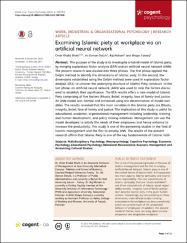| dc.contributor.author | Bhatti, Omar Khalid | |
| dc.contributor.author | Öztürk, Ali Osman | |
| dc.contributor.author | Maham, Raj | |
| dc.contributor.author | Farooq, Waqas | |
| dc.date.accessioned | 2021-04-16T10:10:05Z | |
| dc.date.available | 2021-04-16T10:10:05Z | |
| dc.date.issued | 2021 | en_US |
| dc.identifier.citation | Bhatti, O. K., Öztürk, A. O., Maham, R. ve Farooq, W. (2021). Examining Islamic piety at workplace via an artificial neural network. Cogent Psychology, 8(1). https://dx.doi.org/10.1080/23311908.2021.1907038 | en_US |
| dc.identifier.issn | 2331-1908 | |
| dc.identifier.uri | https://dx.doi.org/10.1080/23311908.2021.1907038 | |
| dc.identifier.uri | https://hdl.handle.net/20.500.12511/6738 | |
| dc.description.abstract | The purpose of the study is to investigate a hybrid model of Islamic piety, by merging exploratory factor analysis (EFA) and an artificial neural network (ANN). The present research was divided into three phases. The first phase applied the Delphi method to identify the dimensions of Islamic piety. In the second, the dimensions established using the Delphi method were used in exploratory factor analysis (EFA) to uncover the underlying structure of Islamic Piety construct. In the last phase, an artificial neural network (ANN) was used to rank the factors discovered to establish their significance. The EFA results offers a new model of Islamic Piety comprising of five factors: Rituals, Belief, integrity, love of family and justice. An ANN model was formed and enhanced using the determination of model variables. The results revealed that the main variables in the Islamic piety are Rituals, integrity, belief, love of family and justice. The implication of this study is useful for educational, academic, organizational management including leadership, training and human development, and policy making initiatives. Management can use the model developed to satisfy the needs of their employees and hence enhance to increase the productivity. This study is one of the pioneering studies in the field of Islamic management and the first to employ ANN. The results of the present research affirm that Islamic Piety is one of the key fundamentals of Islamic faith. | en_US |
| dc.language.iso | eng | en_US |
| dc.publisher | Cogent OA | en_US |
| dc.rights | info:eu-repo/semantics/openAccess | en_US |
| dc.rights | Attribution 4.0 International | * |
| dc.rights.uri | https://creativecommons.org/licenses/by/4.0/ | * |
| dc.subject | Artificial Neural Network | en_US |
| dc.subject | Hybrid Model | en_US |
| dc.subject | Islamic Piety | en_US |
| dc.subject | Islamic Social Responsibility | en_US |
| dc.subject | Islamic Spirituality | en_US |
| dc.title | Examining Islamic piety at workplace via an artificial neural network | en_US |
| dc.type | article | en_US |
| dc.relation.ispartof | Cogent Psychology | en_US |
| dc.department | İstanbul Medipol Üniversitesi, İşletme ve Yönetim Bilimleri Fakültesi, İşletme Bölümü | en_US |
| dc.authorid | 0000-0002-2409-6532 | en_US |
| dc.identifier.volume | 8 | en_US |
| dc.identifier.issue | 1 | en_US |
| dc.relation.publicationcategory | Makale - Uluslararası Hakemli Dergi - Kurum Öğretim Elemanı | en_US |
| dc.identifier.doi | 10.1080/23311908.2021.1907038 | en_US |
| dc.identifier.scopusquality | Q3 | en_US |



















